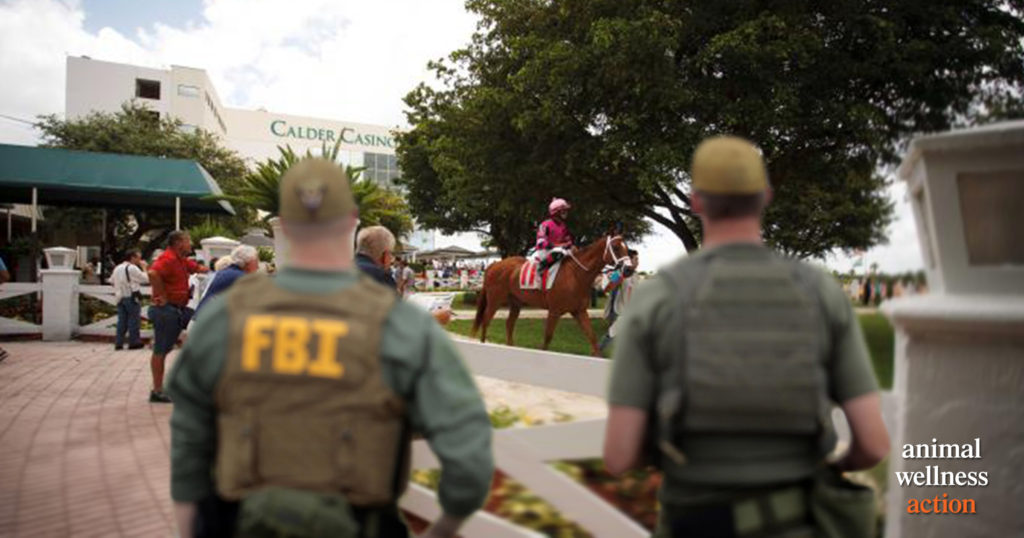My alarm didn’t need to wake me this morning. Instead, it was rapid-fire buzzing from a flurry of incoming calls before the sun rose. It was news of the FBI’s surprise raids at a racetrack and horse training facility in Florida around 5:00 A.M.
I reached out to my contacts at the FBI, and U.S. Attorney’s Office and confirmed that 27 federal indictments were handed down by the Southern District of New York. Well-known trainers, veterinarians, and drug distributors in multiple states were the subjects of indictments, including Jorge Navarro, and Jason Servis, the trainer of Maximum Security whose win at last year’s Kentucky Derby was revoked after judges reviewed the tape and disqualified him for running into another horse. And, Maximum Security just won the $10 million dollar prize at the Saudi Cup less than two weeks ago.
The indictment claims that “virtually all” of Servis’ horses in more than 1,000 races over the past two years were drugged. In reviewing all the indictments of the 27 people named, they detail a scheme of misbranding and distributing various drugs to defraud state regulators, horse racing fans, and the betting public by secretly doping horses in the $100 billion global industry.
According to the Department of Justice, Navarro trained and doped a thoroughbred horse that won the 2019 Golden Shaheen race in Dubai named XY Jet — winning a $1.5 million prize. Navarro allegedly utilized “blood building drugs, which, when administered before intense physical exertion, can lead to cardiac issues or death. Navarro announced XY Jet’s death, as the result of an apparent heart attack, in January of this year.”
“Today’s unsealing of four indictments for widespread doping of racehorses is the largest ever of its kind from the Department of Justice,” said U.S. Attorney Geoffrey S. Berman. “These defendants engaged in this conduct not for the love of the sport, and certainly not out of concern for the horses, but for money. And it was the racehorses that paid the price for the defendants’ greed. The care and respect due to the animals competing, as well as the integrity of racing, are matters of deep concern to the people of this District and to this Office.”
While the Department of Justice’s actions are a thunderbolt and give us great encouragement that justice may be served, it’s just the first critical step if we hope to see serious-minded reform in American horseracing. You see, American horseracing is addicted to drugs, and unlike the drugs at the center of today’s conversation, many others are legal, and have been approved for use by various state racing commissions, and there’s been more scandal with the death of nearly 50 horses at California’s famed Santa Anita Park since December of 2018.
Last year, the New York Times brought to light that Triple Crown winner Justify failed a drug test after winning the Santa Anita Derby in 2018 — a qualifier that preceded the sweep of The Kentucky Derby, Preakness, and Belmont. Unfortunately, the California Horse Racing Board (CHRB) disposed of the review behind closed doors, while its chairman maintained a horse with Justify’s trainer, Bob Baffert.
The partial answer to this long-running scandal is right in front of Congress and the horseracing industry. It is the Horseracing Integrity Act, H.R. 1754/S. 1820 led by Paul Tonko, D-N.Y., and Andy Barr, R-Ky., in the U.S. House, and Kirsten Gillibrand, D-N.Y., and Martha McSally, R-Ariz., in the U.S. Senate. I testified in support of the legislation in January that would protect American racehorses through the establishment of a national, uniform standard for drugs and medication in horseracing. It would also grant drug rulemaking, testing, and enforcement oversight to a private, non-profit, self-regulatory independent organization managed by the United States Anti-Doping Agency (USADA) — the governing body that runs the Olympic anti-doping program.
The bill’s backed by a broad base of industry players, including members of the Coalition for Horseracing Integrity, which range from The Jockey Club, The Stronach Group, The Belmont, The Breeders’ Cup, Keeneland, the Water, Hay, Oats Alliance, the U.S. Harness Racing Alumni Association, racetracks and animal protection groups like Animal Wellness Action and the Animal Wellness Foundation.
Over the past year, we’ve seen more than 500 horses die at American racetracks, and the body count climbs every day. Our tracks are turning into crash sites. Unscrupulous trainers that drug horses are not only putting animals and jockeys at risk of life and limb, but they are rigging the system and making a mockery of anyone who bets based on their knowledge of the athletes involved. The betting public will no longer tolerate the racing industry’s drug addiction, and we applaud the Department of Justice for curbing doping abuses. What more evidence does Congress need to step up and pass comprehensive legislation to end performance-enhancing drugs in American racing?
Please contact your Members of Congress today by clicking here and asking them to cosponsor the Horseracing Integrity Act — you can and will make the difference.
Marty Irby is the executive director at Animal Wellness Action and a lifelong horseman who resides in Washington, D.C.
